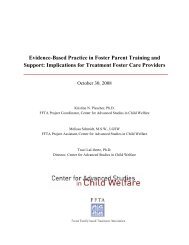Independent Living Program - Florida's Center for Child Welfare
Independent Living Program - Florida's Center for Child Welfare
Independent Living Program - Florida's Center for Child Welfare
- No tags were found...
Create successful ePaper yourself
Turn your PDF publications into a flip-book with our unique Google optimized e-Paper software.
Quality of Practice Standards<strong>Independent</strong> <strong>Living</strong>/Teen Plan46.0 The teen-aged focus child is af<strong>for</strong>ded opportunities to participate in normal lifeskills activities in the foster home and community that are reasonable andappropriate <strong>for</strong> his/her respective age or special needs, (applicable to licensed outof-homecases)Requirement: To prepare a teen-aged child in foster care to ultimately live independently, theymust have opportunities to participate in life skills activities in their homes and communities thatare reasonable and appropriate <strong>for</strong> their age or any special needs they might have (previouslyreferred to as the normalcy plan or a plan <strong>for</strong> age-appropriate activities). It is the case managementagency's responsibility to ensure these opportunities are available so that the child can increasehis/her ability to eventually live independently and become self-sufficient. Clear documentationspecific to the negotiation of. and agreement to, the teen's plan should be recorded in the case fileand signed by the teen, the foster parent and case manager.Instructions and Considerations:available <strong>for</strong> the focus child to:Reviewers must determine if appropriate opportunities are• Participate in age appropriate activities and manage age appropriate responsibilities;• Interact with mentors;• Learn nutritional and financial skills;• Socialize and have normal life experiences; and• Receive allowances, etc.Since the state does not require a standardized 'Teen Plan" <strong>for</strong>mat, some case managementagencies may opt to use different <strong>for</strong>mats to document the negotiation of, and the agreement to, theteen's plan; there<strong>for</strong>e, reviewers will need to inquire as to local practices when rating this standard.The "Teen Plan" must be updated quarterly.Rating:>^ Yes if documentation in any written <strong>for</strong>mat, and signed by the teen, the foster parents(caregiver or residential child-caring agency) and the case manager, clearly reflects an ageappropriate plan is in place to assist the teen toward independence, and the documentationsupports the child was af<strong>for</strong>ded opportunities to participate in normal life skills activities.>^ No there is minimal documentation of a teen plan, or no teen plan was found in the file, orthe teen plan was not signed by all required participants, or no documentation the child wasaf<strong>for</strong>ded opportunities to participate in normal life skills activities.S NA if focus child is not a teenager living in a foster care placement.References: s.409.1451 (3)(a)l-4; Florida Administrative Code 65C-30.007(1) (a-d), August 31,2005 Memorandum, Well-Being Outcome 1. Item 1Office of Family Safety | Florida Department of <strong>Child</strong>ren and Families ! FY 2010/2011 (Version 1 of 1 July 1, 2010)
















